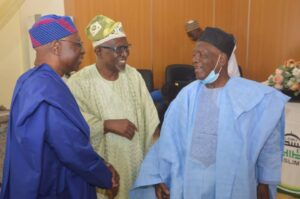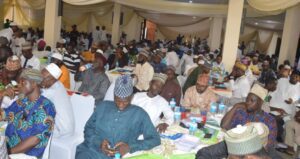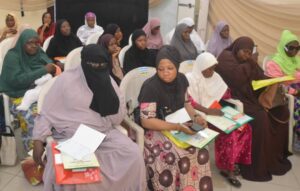– We need prophetic medicine centres: Dr. Olohunoyin
– Let’s increase awareness on prophetic medicine, Ustadh Aderogba charges Muslim stakeholders
Revered Muslim scholars and orthodox medical practitioners have called for increased awareness about prophetic medicine and the establishment of centres for practitioners in Nigeria.
They made the call on Monday at the 2023 edition of the Annual Imams Conference, organised by Lekki Muslim Ummah (LEMU), an umbrella organisation for all Muslims in the Lekki Peninsula area of Lagos State, Nigeria, with the theme, Health is Wealth.
The event which took place at the Vice Admiral Jubrila Ayinla Multipurpose Hall, Lekki Central Mosque, Lagos, drew scores of participants from the mainland and other parts of the state.
Chief Imam of Lekki Central Mosque, Sheikh Ridwanullah Jamiu, told Muslim News on the sidelines of the event that the conference had previously analysed several topics including “funeral rites in Islam”, which formed the thrust of 2022 edition.
He said, “This year, we thought of exploring the aspect of prophetic medicine. We are looking for opportunities for our Imams. You can be Imam and at the same time a practitioner in prophetic medicine. It will be beneficial to the society. We have many of our scholars who are into prophetic medicine. We thought we should bring them together and let our Imams who do not have knowledge of it gain some insights. They may want to tap into it and develop themselves to become practitioners.”
The Imam, who delivered an opening remark, lamented the dearth of research in the field of prophetic medicine, stressing there are lots of benefits in the industry.
“Prophetic medicine is a really rich industry, but the challenge is that people have not done enough research in the field. The industry has to be enhanced and regulated. In fact, we need an Islamic medical centre where prophetic medicine practitioners can be brought together with the orthodox medical practitioners in one roof for some cross-fertilisation of ideas.
“The Prophet (SAW) gave us the medicinal value of so many things, but we have not actually been able to derive the maximal benefits of those things. So, we need to create awareness and motivate people to do more research in this area. It can serve as alternative medicine, help humanity and serve as source of income for our Imams.”

Responding to an enquiry on the increased population of the participants compared to the last edition, Imam Jamiu said LEMU enhanced its network for this edition.
He said, “We used some network with the Lagos Central Mosque. We also met with Muslim leaderships that could attract participants to the programme. And perhaps what attracted people to attend this edition is the feelers they got from those who had previously attended on what they would be benefitting from the programme. Meanwhile, we also facilitated transportation for participants.”
We need prophetic medicine centres – Dr. Olohunoyin
One of the invited lecturers, Dr. Dhikrullah Shafi’i Olohunoyin of Al-Hikmah University, Ilorin, Kwara State, emphasised the need for the establishment of centres for prophetic medicine practitioners in Nigeria.
He said the reason for the low attention prophetic medicine receives is due to the fact that practitioners are not established with centres, adding that the Muslim community needs to unite efforts to create centres for prophetic medicine where the practitioners can operate seamlessly.
“We have individual specialists in their own rights scattered across the country who do Islamic medicine in line with the Sunnah. The challenge is that most of these specialists are not established, and their work requires building a team and a comfortable centre. It is not something they can do alone. And everything boils down to finance.
“My advice therefore is that Muslims in various states should collaborate with these specialists to build centres for Islamic medicine and ruqyah. That’s the best way to go. Individual efforts won’t achieve much, it has to be coordinated.”
Dr. Olohunoyin, who spoke on the topic: Differentiating between Shirk and Medicine, acknowledged that efforts are being made by some spirited practitioners to establish centres for themselves.
“We have specialists in Islamic medicine who practice in line with the Sunnah. We have some of our brothers in Ibadan, Oyo State, under the aegis of At-Turaath. It is a health organisation that incorporates Islamic medicine in its practice, compromising both male and female specialists. Females attend to female patients, while males attend to male patients.”
The respected Islamic scholar clarified that prophetic medicine must be in line with the Qur’an and Sunnah, noting anything outside the two is shirk (idolatry).
He encouraged Muslims to make their imaan (belief) in Allah stronger, as prophetic medicine requires a full measure of faith.
“To practice Islamic medicine, we have to be familiar with the Quranic verses that work for healing. Then, we should also do everything within the tenets of Islam. We must have the firm belief that Allah is the only one that heals. All other things people call upon are mere creatures, whether it is the jinn or angels. All of them do not heal, it’s only Allah that heals. It should be in our belief therefore that it’s only Allah that heals.
“Similarly, it must be in line with the tenets of Islam like I said. We have verses we chant for healing in the Qur’an, as well as some wordings in the Sunnah. These are things we must be conversant with so as not to transgress. What we chant must have clear meanings understandable to everyone. When what we chant for healing does not have meaning, we might be transgressing and committing shirk. For instance, the incantations chanted by Yoruba traditionalists are mostly understood amongst the initiated alone.
“In most cases, when patients are told to consult beyond the hospital, what is meant by that saying is for them to visit traditionalists. These traditionalists use nothing but Shaitan. For me, there is nothing these traditionalists do that specialists in Islamic medicine cannot do far better. We should value the Qur’an we have with us because it is healing for all kinds of ailments. Recitation of ruqyah provides healing once we have the required iman (faith). People are not firm in their faith. They nurse some elements of doubt and that is why the Islamic medicine appears not to work for them. We should have faith.”
Let’s increase awareness on prophetic medicine, Ustadh Aderogba charges Muslim stakeholders
For his part, another invited lecturer, Ustadh Musharaf Aderogba who is based in Saki, Oyo State, urged Muslim stakeholders to ramp up advocacy and awareness efforts on prophetic medicine.
According to him, “We must make Muslims understand that the solutions to most of our ailments is in prophetic medicine which is also called alternative medicine. There is an advocacy in the media that people should return to alternative medicine because the chemicals in orthodox medicine have side effects for our existence.

Cross sections of participants at the conference
“We have to create awareness for prophetic medicine. If we say we have financial challenge, that means we are not being honest with ourselves. We have wealthy people among us in the Muslim community. We just need to make more awareness to preach the benefits of prophetic medicine. For me therefore, awareness is the first thing,” he added.
Ustadh Aderogba, who spoke on Prophetic Medicine to the Rescue: Prescriptions for Common and Terminal Ailments also noted that government intervention would be required for our indigenous experts to produce prophetic medicines in Nigeria.
He said, “Most of the prophetic medicines here in our country are imported. This is essentially because our experts in botany and other fields who are supposed to help in this regard are only fixated with academics. There is little to no practice. Well, I feel they may need some level of government support and intervention to embark on this. For instance, they require sophisticated machines to produce these items. The pharmaceutical companies we have in Nigeria only make provision for orthodox medicine.
“In most cases, orthodox medicine is being sponsored by developing countries to generate income. If we should also examine it, the requirements for orthodox medicine are not as costly as that of prophetic medicine. That’s why only Islamic countries that understand its value are the few who take prophetic medicine with keen dedication.”
The experienced practitioner said they have made efforts to provide prophetic medicine solutions to heal some of the prominent ailments that affect people in Nigeria.
“There are many herbs/seeds within our environment that we can extract oil from to cure ailments. For instance, bitter kola aids sexual performance though it has side effects because it contains caffeine. But then, that does not say we can’t use it, we should only prescribe another medicine that will suppress the side effects.”

He expressed hope that with increased awareness about prophetic medicine, the practice will grow beyond bounds in the country.
“I reiterate that we need more awareness. We still even have some of our Muslim brothers who practice orthodox medicine tackling us that we only endanger people’s lives with our so called prophetic medicine. But what we should ask them is that what has been the practice before their own orthodox medicine? So, we need awareness. We will get there anyway, I am so hopeful.”



